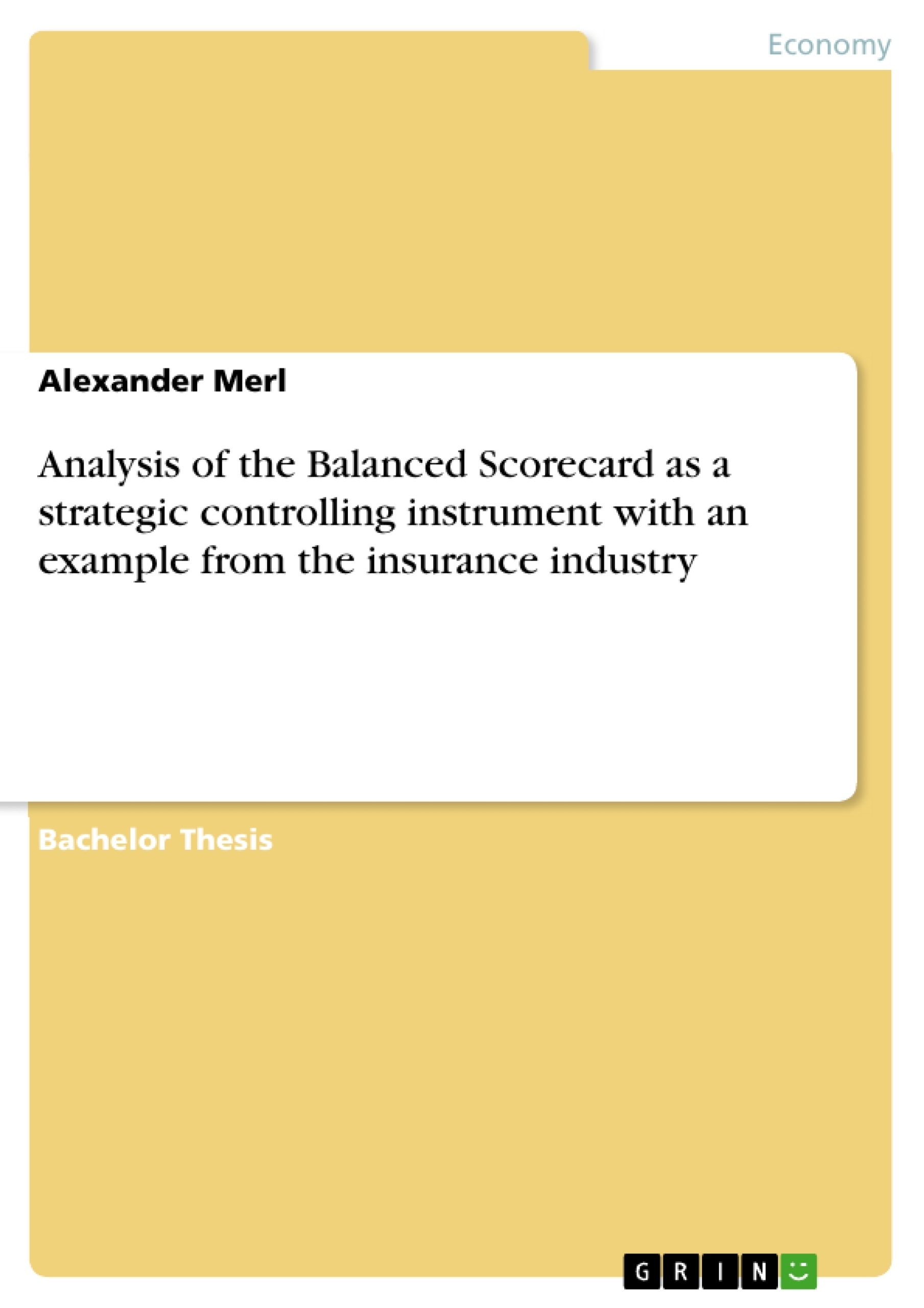In view of the growing competition, the increased change in customers’ wants and the potential of new communication and information technologies, more and more companies are faced with the need to permanently adjust and further develop their processes, products and offer. To be able to exist in the market, a company must be in a position to recognise future developments early and include them in the strategy. A company should therefore use
management instruments which make it able to adjust strategies quickly and communicate them transparently in the whole company.
There is increasing criticism of the classical controlling instruments. It is argued that controlling is supposed to provide management relevant data for the management which do not only include financial historical information as so far, but also include future related non-monetary figures. Against this background the Balanced Scorecard (BSC) is becoming more important. It extends the previous focus on finance issues to assess the performance of a company with a range of other aspects and ratios. The customer
perspective, the internal process perspective and the learning and development perspective are supposed to be considered equally next to the financial perspective in the BSC.
The targets of this thesis are split into a main target and a sub target. The main target of this paper is split again into two parts:
The first part of the main target is to show and to explain the relevant theoretical framework of the BSC, in particular to strategic controlling. The second part of the main target is to analyse the BSC as a strategic management system and to give an overview about this strategic controlling tool as it is seen in academic literature. The sub target of this paper is to provide a link between theory and practice by applying the theory to a current example taken from the insurance industry. The result is a recommendation for a BSC as a strategic controlling instrument for that specific insurance company. With this specific BSC for an insurance company comes also a tool for a well structured evaluation of the chances and risks involved with its application.
Inhaltsverzeichnis (Table of Contents)
- Introduction
- The problem
- The goal
- Structure of the analysis
- Controlling
- Definition of controlling
- Goals and duties of controlling
- The controlling system
- Strategic versus operative controlling
- Selected performance measurement systems
- BSC as a management system
- Accruement and development of the BSC
- Structure and goals of a BSC
- Perspectives of the BSC
- The financial perspective
- The customer perspective
- The internal-business-process perspective
- The learning and growth perspective
- Other perspectives
- Requirements and implementation process of a BSC
- Chances and risks of a BSC
- Chances of a BSC
- Risks of a BSC
- The BSC as a management system in the ABC1 Versicherungs AG
- The insurance industry
- The company
- Controlling in the ABC1 Versicherungs AG
- BSC as a strategic controlling instrument in the ABC1 Versicherungs AG
- Perspectives of the company's BSC
- Implementation of the BSC in the company
- Chances and risks of using the BSC in the company
- Critical comments
- Summary
Zielsetzung und Themenschwerpunkte (Objectives and Key Themes)
This thesis aims to analyze the Balanced Scorecard (BSC) as a strategic controlling instrument within the insurance industry. It examines the development, structure, and implementation of the BSC, exploring its effectiveness as a management tool.
- Definition and application of the BSC
- The BSC as a strategic controlling instrument
- Implementation and use of the BSC within a specific insurance company
- Benefits and challenges associated with utilizing the BSC
- Evaluation of the BSC's effectiveness in achieving strategic objectives
Zusammenfassung der Kapitel (Chapter Summaries)
The thesis begins by defining controlling and exploring its various forms, focusing particularly on strategic controlling. It then introduces the BSC, discussing its development, structure, and application. The subsequent chapter examines the BSC in practice by analyzing its implementation within a specific insurance company, ABC1 Versicherungs AG. This includes analyzing the company's specific perspectives and highlighting the advantages and disadvantages of the BSC in their context.
Schlüsselwörter (Keywords)
The key terms and concepts explored in this thesis include: Balanced Scorecard, strategic controlling, management accounting, performance measurement, strategic management, insurance industry, implementation process, business strategy, financial performance, customer satisfaction, internal processes, learning and growth, and risk management.
Frequently Asked Questions
What is a Balanced Scorecard (BSC)?
The BSC is a strategic management system that translates a company's vision and strategy into a set of performance measures across four perspectives: Financial, Customer, Internal Process, and Learning & Growth.
Why is the BSC important for the insurance industry?
In a competitive market, it allows insurance companies to include future-related non-monetary figures, such as customer satisfaction, alongside traditional financial data.
What are the four main perspectives of the BSC?
They are the financial perspective, the customer perspective, the internal-business-process perspective, and the learning and growth perspective.
What are the risks of implementing a BSC?
Risks include excessive complexity, wrong selection of key performance indicators (KPIs), and failure to communicate the strategy transparently throughout the company.
How does the BSC link theory and practice?
The paper demonstrates this by applying the BSC framework to a specific case, the ABC1 Versicherungs AG, to evaluate its strategic controlling effectiveness.
- Arbeit zitieren
- Alexander Merl (Autor:in), 2007, Analysis of the Balanced Scorecard as a strategic controlling instrument with an example from the insurance industry, München, GRIN Verlag, https://www.grin.com/document/78851



